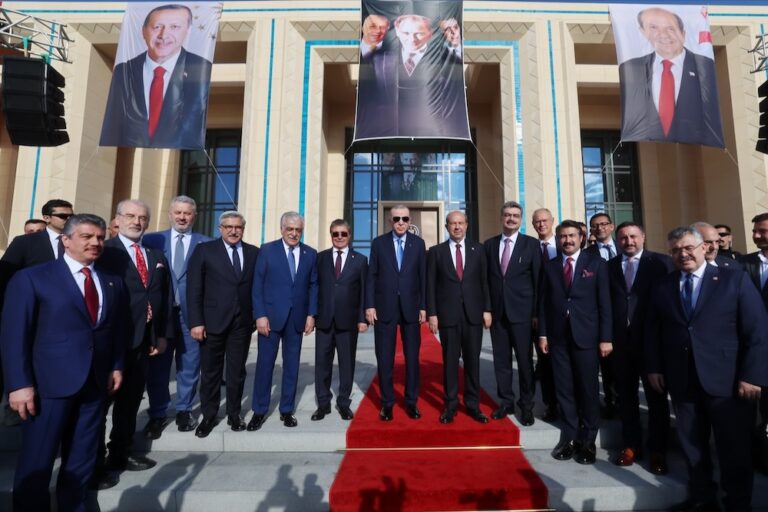Special International Day to End Impunity Issue: Cathal Sheerin's latest Europe & Central Asia brief shines a light on the intersections between impunity, journalists' safety, and elections, based on IFEX member reports and news from the region.
The International Day to End Impunity; Kyrgyzstan’s ‘foreign agents’ bill; worrying signs for press freedom in Bosnia and Herzegovina; a landmark moment for SLAPPs in the UK; Poland’s elections show need for Europe-wide Media Freedom Act.
IDEI: Safety of journalists during elections
Elections in Europe and Central Asia are sometimes fraught periods for the media. Journalists will often have to deal with an increase in the various kinds of threats that they otherwise might face only infrequently.
The theme of this year’s International Day to End Impunity for Crimes Against Journalists – the safety of journalists during elections – is an opportunity to review the threat-patterns that were present during recent elections in Poland, Slovakia and Turkey.
In Poland, the pervasiveness of disinformation was particularly prominent in the weeks leading up to the October vote: the electoral campaign of the then ruling Law and Justice Party (PiS), which pumped out an almost constant stream of anti-migrant rhetoric, was described by experts as “drowning in disinformation”; the largest opposition party, Civic Platform (PO), was widely criticised for an election ad which used an AI-generated ‘deepfake’ video that imitated the Prime Minister’s voice; and citizens received bizarre, slightly macabre text messages falsely claiming that PiS would provide free funerals for pensioners (PiS denied responsibility for these messages and it was unclear who sent them or why).
The dissemination of disinformation, in addition to disempowering voters, creates a toxic environment that undermines serious journalism and puts journalists’ safety at risk: the role of disinformation in fuelling online violence and offline assaults on members of the press (especially women journalists) is well documented.
Similarly, attempts by politicians and their media allies to smear or undermine critical reporters – particularly during elections or other periods of change – also put journalists at risk.
This latter kind of attack was also very evident in the build-up to Poland’s elections, as the Media Freedom Rapid Response (MFRR) mechanism notes in its recently-published report on the first six months of 2023. MFRR describes PiS and its allies as exerting “escalating pressure” on the critical press during this period. Its report records attacks on 30 persons or media-related entities, of which just under half were “legal incidents” (such as lawsuits or investigations), while over a quarter were public attempts by the government or its supporters to smear and delegitimise independent reporters.
In Europe and Central Asia there are several politicians and parties that deploy this tactic against their critics. Populist leader Robert Fico, re-appointed Slovakia’s prime minister in October following elections in September, is well known for his scathing attacks on journalists. Last year, he described reporters as “an organised criminal group with the aim of breaking Slovak statehood,” and urged the police to investigate them. Previously, he referred to some journalists as “dirty anti-Slovak prostitutes.”
A recent study shows that, during the lead-up to the vote in Slovakia, Fico’s Direction – Social Democracy (Smer) party published 174 posts targeting journalists on social media; Smer also paid Facebook to have their posts targeting journalists shown to more than 1.5 million people.
Fico’s callous disregard for the potential consequences of such tactics is very telling, especially when one considers how he was forced to resign as prime minister in 2018 following the murder of Ján Kuciak, a journalist who was investigating corruption in Fico’s government and whose case drew global attention to the problem of impunity in the country.
But when it comes to putting journalists’ safety at risk during election periods, Turkey was by far the worst offender of 2023.
One major threat to journalists ahead of the vote was the ratification – in October 2022 – of the controversial ‘disinformation law’, under which those convicted of “disseminating misleading information” face up to three years in prison. This much-protested legislation was viewed by press freedom groups as a move to silence public criticism and debate ahead of the 2023 election. In February 2023, Kurdish journalist Sinan Aygül became the first member of the press to be sentenced under this law: he was handed a ten-month jail term.
In the weeks preceding the May vote, the Turkish authorities intensified their crackdown on Kurdish journalists and other government critics, many of whom were hit with bogus “terrorism” charges. April saw 16 Kurdish journalists indicted on charges of “membership of an illegal organisation”; at least another ten were arrested in a wave of arrests of Kurdish journalists, activists and politicians later that month. Reporters Without Borders (RSF) described these detentions as “a political manoeuvre designed to dismantle pro-Kurdish media and destabilise opposition parties before the elections”.
The final months of the pre-election period were more fraught than usual as a result of the deadly earthquake that hit Turkey in February. Determined to control the message while the government was being accused of mismanaging the rescue and recovery operation, the authorities arrested several journalists (many under the aforementioned ‘disinformation law’). Members of the press were physically attacked by state agents and members of the public. Fines were also imposed on broadcasters for critical coverage of the government’s emergency response. The harassment and attacks on journalists continued on election day and beyond.
One thousand days behind bars
In October, Index on Censorship launched a solidarity campaign for their former colleague, imprisoned journalist Andrei Aliaksandrau, marking 1,000 days that he had been behind bars in Belarus on trumped-up charges. Working with the Belarusian poet Hanna Komar, Index translated a poem that Aliaksandrau wrote while in pre-trial detention and produced a short video of some of his friends and former colleagues reading the poem aloud:
Mid-month, the UN Working Group on Arbitrary Detention found that Belarus violated international human rights law by imprisoning RFE/RL journalist Ihar Losik in 2020. Losik is currently serving a 15-year prison sentence on spurious charges of “organising mass protests” and “inciting hatred”.
According to the Belarusian Association of Journalists, by late October there were 34 journalists behind bars in Belarus. Human rights group Viasna lists 1,449 political prisoners in the country’s prison system.
In brief
October saw welcome news in the UK with the passage of the Economic Crime and Corporate Transparency Act, which includes the first anti-SLAPP provision in UK law. The UK Anti-SLAPP Coalition described it as “an important step towards stamping out SLAPPs”, but underlined that the legislation – which is restricted to those speaking out about economic crimes – falls short of providing universal protection from these gagging lawsuits.
In Russia, the persecution of independent journalists and anti-war voices continues. RFE/RL Russian-American journalist Alsu Kurmasheva was arrested in October and placed in pre-trial detention on charges of failing to register as a ‘foreign agent’. She is due to stay in detention until 5 December.
Exiled journalist Marina Ovsyannikova – who protested Russia’s invasion of Ukraine on live TV – was sentenced in absentia to 8.5 years in a penal colony for “spreading false news about the Russian Army”; blogger Aleksandr Nozdrinov received the same sentence (though he was present in court) on the same charges in late September.
In Italy, journalist Roberto Saviano was convicted of criminally defaming Prime Minister Giorgia Meloni. He avoided a potential prison sentence, but was fined 1,000 euros.
In Kyrgyzstan, a Russia-inspired ‘foreign agents’ bill passed its first reading in parliament in late October. If the bill becomes law, Human Rights Watch says it will have a “chilling effect on Kyrgyzstan’s vibrant civil society”. The Committee to Protect Journalists warns that it will “further restrict the country’s beleaguered free press”.
Also in Kyrgyzstan, IFEX called on the authorities to withdraw their lawsuit aimed at liquidating Kloop Media and cease their ongoing persecution of independent media.
Following a mission to Bosnia and Herzegovina in October, partner organisations of the MFRR concluded that press freedom is in decline owing to: “new restrictive laws, hostile rhetoric and denigration of journalists by public officials, and ongoing systemic challenges to the independence of public service media”. The mission partners met with several journalists who had been attacked because of their work. MFRR highlighted the recent re-criminalisation of defamation and ‘foreign agent’ legislation in Republika Srpska (one of two entities composing Bosnia and Herzegovina) as being particularly threatening to the free press.
MFRR partners also pointed to Poland’s recent national elections – in which the ruling PiS party’s influence over public media and the use of state resources gave it a significant advantage over its rivals – as evidence for the need for a strong European Media Freedom Act (EMFA):
If the EU is serious about protecting media freedom in Europe, and thereby ensuring free and fair elections, it must adopt the European Parliament’s position on the EMFA with all its safeguards related to surveillance, public service media, ownership transparency, editorial independence, independent national and Europe wide media regulators, media pluralism and the misuse and abuse of state funds.



